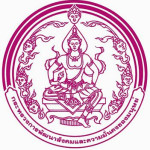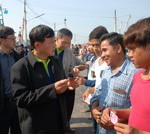
Thailand’s government has shown that it wants to take strong action to end Illegal, Unreported and Unregulated (IUU) fishing, the United States Science Envoy for the Oceans Jane Lubchenco said last week during a visit to Bangkok in which she called on nations around the world to end overfishing and protect marine natural resources.
“It is possible to end overfishing and rebuild the stock. Fishermen want to see well-managed fishing. We think about how much we can put in and take out from the ocean. Fishing is not for today, but for tomorrow,” Lubchenco said during a lecture she delivered at Kasetsart University entitled New Approaches to Fisheries Bring Hope for Food Security and Jobs.
Illegal, Unreported and Unregulated (IUU) fishing is a global problem, Lubchenco said, and Thailand’s government, well aware of the problem, is demonstrating a desire to take strong action to improve trading practices with other countries.
Under Prime Minister Prayut Chan-o-cha, Thailand has developed and is implementing a program of comprehensive reforms of its fishing and seafood processing industries, both of which had grown rapidly over the past two decades but were neglected in terms of regulation and oversight. That lack of oversight led to overfishing, environmental destruction and other problems including labor abuse and human trafficking.
Under the Government’s recently adopted Marine Fisheries Management Plan, officials are using a science-based approach to determine the maximum sustainable yield Thailand’s territorial waters can provide based on their natural resources. The government is committed to ensuring that Thailand’s fishing fleet does not exceed that yield.
Other measures taken include the establishment of the Command Center to Combat IUU Fishing (CCCIF), which has strong legal, regulatory and management authority over the industries and the 42,000 ships that comprise the country’s commercial shipping fleet. Strict rules on when and where vessels can fish, and the types of equipment used, are being enforced. Destructive fishing gear has been banned.
The authorities have grounded 8,024 fishing vessels that have not met the new rules and regulations, and are preparing a buy-back program for the owners of those ships. Despite protests and threats from owners and crews, the government has not backed down.
The CCCIF has set up 28 Port-in/Port-out inspection centers where it has conducted tens of thousands of inspections along with 8,398 inspections at sea from May 2015 through January this year. QR codes have been affixed to most vessels for identification and 4,562 vessels 30 tons or larger have installed vessel monitoring systems (VMS) so that authorities can track them for suspicious activities.
The private sector has also been taking action. Several of Thailand’s largest seafood companies have joined the Shrimp Sustainable Supply Chain Task Force, an international industry alliance including leading U.S. and global retailers, manufacturers, government and NGO’s. It is tasked with ensuring Thailand’s seafood supply chain is free from illegal and forced labor and that products are not sourced through IUU fishing.
The membership, objectives and a progress report of the Task Force can be found at: http://www.shrimptaskforce.global/
Photo credit: nationmultimedia.com




